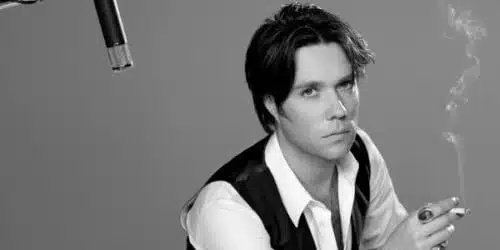
Elvis Costello wears a silly hat throughout this episode of Spectacle. It distracted me. (The offending accessory is a red, short-brimmed fedora that appears to be made from, ahem, velvet.) Is he attempting to be ironic, given that this episode deals with, among other things, pop standards — and, furthermore, that he opens the show with a winking cover of “If I Only Had a Brain”? (A performance that seems to say, Get it, if I only had a brain? Obviously I do have a brain, a big one at that; ergo, what I’m doing here with this song amuses me so.) Does he think that this sort of questionable fashion choice is, in fact, the sort of thing that would impress or entertain a gay man? His guest, after all, is Rufus Wainwright, who makes no mention of the hat, this velveteen red elephant sitting atop the host’s head in a cocked, taunting fashion. (Wainwright does, however, stumble through many an answer — behavior that one could logically attribute to the absurd trauma of having questions posed to you by a man in a funny hat.)
I tried not to let said hat completely overpower my enjoyment of this episode of Spectacle: Elvis Costello With… (airing Wednesdays at 9pm EST/PST on the Sundance Channel) — obviously, I half-succeeded, both in the actual watching of the episode and in my summation of it here. Now, then, let’s move on: Wainwright is a perfectly fine guest, inclined to discuss the more “genteel” areas of Costello’s music appreciation — opera, standards, Romantic poets and composers. The conversation gets off to a rocky (and, frankly, uninteresting) start, mainly due to confusion that develops between Costello’s questions and Wainwright’s answers. The two never go in-depth on any one subject (indeed, there seem to be a number of missed opportunities for a truly satisfying back-and-forth), though they do hit upon a number of worthwhile topics, such as: the so-called sophomore album slump, Jeff Buckley (Wainwright goes on to perform “Memphis Skyline”, which he wrote for the late singer-songwriter), the possessive of an audience, Judy Garland, gay songwriters, Loudon Wainwright III (Costello performs his “New Paint”), and the folk-music scene.
When Wainwright performs — the aforementioned Buckley tribute, for example, or an especially rich version of “Vibrate” — he seems, suddenly, to tap into something far more profound than the interview segments allow. When describing his music in relation to the works of the songbook composers of decades past, Wainwright explains that “it’s important that it’s relevant — I don’t want to be a historian”. You can hear this desire in his music, in how it engages with classical beauty while speaking urgently of the now.
